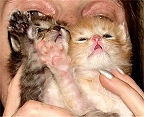|
Adopting a Kitten
Saving Lives: Whether you adopt a pet from a local animal shelter or a rescue organization, humane society, you're saving lives.
That's right: lives, as in more than one. I know, I know…you only want to adopt one kitten or cat, right? Adoption saves more than just the life of the pet you adopt.
If you adopt from an animal shelter, you're making room for another dog or cat, or you're allowing other dogs or cats at the shelter to be kept for a longer period of time, giving them a better shot at being adopted.
If you adopt from a humane society or a rescue organization, you're allowing that organization to rescue another dog or cat for adoption at a public shelter, which, of course, saves the life of that little guy plus the lives of others at that shelter by creating space so new pets can be kept longer. As you can see, adoption is truly a continuous cycle of saving lives and it's the right thing to do!
Finding the right kitten
Choose a Personality
Stroll past a few cat cages at the shelter, and you'll notice that some cats meow for special attention, while others simply lie back and gaze at you with an air of superiority. There are as many different personalities of cats as there are cats in the shelter. Which disposition is best for you? You have to decide.
But regardless of individual personality, look for a cat who's playful, active, alert, and comfortable while being held and stroked. At the shelter, ask an adoption counselor for assistance when you wish to spend some time with individual cats. Keep in mind that, because they are in an unfamiliar environment, some cats who are usually quite social may be frightened or passive while at the shelter.
>>Return to Top<<
Kitten or Cat?
As a general rule, kittens are curious, playful, and full of energy, while adult cats are more relaxed and less mischievous. Kittens also require more time to train and feed. Cats are only kittens for a few months, though, so the age of the cat you adopt should really depend on the level of maturity you're looking for. Young children usually don't have the maturity to handle kittens responsibly, so a cat who's at least four months old is probably the best choice for homes with young children.
>>Return to Top<<
Short-haired or Long?
Cats can have long, fluffy coats or short, dense fur, and the choice between the two is chiefly a matter of preference, availability, and your willingness to devote time to regular grooming. You'll see more short-haired cats at the shelter since they're the most popular and common cats. Keep in mind that long-haired cats require frequent grooming to be mat-free. Felines with short coats also require brushing, though less frequently. Most cats enjoy a regular brushing and will look forward to this daily ritual with you.
>>Return to Top<<
Room for One More
If you already own a cat or dog, you're probably wondering how easy it is to add a cat to the family. The good news is that cats can get along with other cats and—despite the common stereotype—most dogs can get along with cats. The bad news is, introducing a new cat to a home with other pets will require some patience on your part.
The best way to handle adding a new cat to the home is to provide time for a period of adjustment. You can do this effectively by isolating your new feline in a room of his own for a while—something that's a good idea for a new cat anyway.
After several days, supervise meetings between the animals for periods of increasing length. Most cats will soon learn to accept each other, and some may quite possibly become the best of buddies. Some dogs simply won't tolerate the presence of a cat, but by carefully introducing them, most problems can be solved.
>>Return to Top<<
Be Responsible!
Regardless of the cat you choose, you'll want to start being a responsible pet owner right away. The easiest way to do that is to keep your cat indoors with you from the very beginning. If you don't let your new friend outside, he'll never miss it, and will have a much better chance of still being around to sit on your lap a few years from now.
The other big staple of responsible cat ownership is having your female cat spayed or your male cat neutered. Spaying or neutering will ensure that your cat never adds to the millions of animals born each year who never find a good home. It'll also help him or her live a longer, healthier life.
>>Return to Top<<
Adopt a Cat for Life
Finally, remember that you're making a commitment to love and care for your new pet for his or her lifetime—which could mean 10, 15, even 20 years. So choose your new pal carefully and be a responsible pet owner. In no time at all, you'll know how wonderful sharing your home with a cat can be.
>>Return to Top<< |


